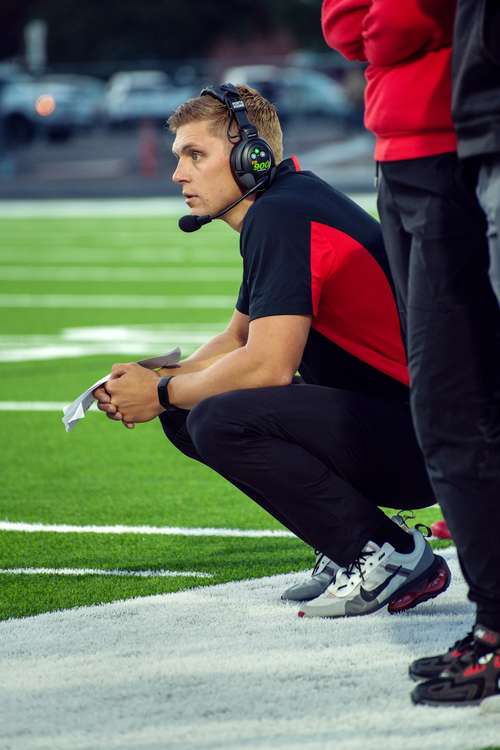In a stunning move that rocked college football, Penn State has fired head coach James Franklin following a series of disappointing losses. The final nail in the coffin came after a grueling double-overtime defeat to Oregon and a subsequent loss to Northwestern, leaving fans and alumni reeling. There’s no doubt that this decision marks a major turning point for the university athletics and the Nittany Lions' football program. Many are already speculating on what the future holds and who might be next to take over the reins.
The announcement sent shockwaves through the sports community as discussions about team management and the coaching staff flooded social media and news outlets. Franklin, who served for 12 seasons, expressed responsibility for the team’s poor performance in recent games, showing a tone of accountability that some found admirable and others viewed as an admission of defeat. But in the fast-paced world of college football, results are what matter most.
For fans keeping up with the sports update, it’s a bittersweet moment. You wonder how quickly fortunes can change in college football. A few wins gone awry have led to an irreversible coaching change. This article delves deep into the circumstances leading up to this decision, the potential impacts on Penn State’s program, and what might lie ahead for the iconic football team.
The Decision to Fire James Franklin
This decision came after months of speculation and mounting pressure. Football news and sports updates consistently spotlighted Franklin’s struggles, and the recent losses appeared to be the tipping point. In a situation as dramatic as this, every misstep on the field has a ripple effect across university athletics. The loss to Oregon in double-overtime was especially hard to digest, as it underscored the team's inability to perform in high-stakes moments.
The decision wasn’t made lightly; it reflects an ongoing conversation about leadership and accountability in college football. Penn State has always prided itself on having a top-tier program and a winning legacy. However, when the team management feels that the head coach isn’t aligning with the expected standards, change becomes inevitable. While Franklin has a track record that includes some memorable seasons, the current chapter has been marred by inconsistency and unexpected turnaround losses.
To be fair, James Franklin’s tenure saw periods of promise. Some past seasons gleamed with hope and flair, but the repeated setbacks have overshadowed those accomplishments. It’s almost as if the team lost its way in the storm of intense NCAA competition, and Pennsylvania’s storied football program had to chart a new course.
Impact on the Penn State Program
Fans and pundits alike are wondering what the fallout will be from such a drastic coaching change. Penn State, known for its resilient spirit, now faces the daunting task of rebuilding trust, strategy, and team morale. This phase is like turning a ship around in choppy waters—challenging, but necessary if the program is to move forward.
There are several factors at play. The enormous buyout, now rumored to exceed $50 million, places significant financial weight on the decision. It’s a stark reminder that, in the world of college football, coaching contracts aren’t just promises—they’re major investments. Over time, such decisions can ripple through the coaching staff and affect morale on both sides of the sidelines.
The dismissal of Franklin also leads to a series of introspective questions for the wider athletics department. What went wrong? How could previous signs have been addressed earlier? It feels like a high-stakes game where one miscalculation puts the entire strategy in jeopardy. Penn State now must realign its team management philosophies to sustain its esteemed legacy as one of college football’s perennial powerhouses.
Many fans are now discussing potential strategies to rebuild. With the vacancy left by Franklin, there is talk about attracting experienced hands possibly from the ranks of former NFL head coaches. The idea isn’t far-fetched given the current trend in university athletics to bring in pro-level expertise. The future of recruitment, team management, and game tactics all hang in a delicate balance as the Nittany Lions look for direction.
Future Speculations and The Path Forward
As we gaze into the future, the transition period for Penn State is threaded with both uncertainty and possibility. The speculation has already begun about who will fill the huge shoes left by Franklin. Could it be a familiar name from the collegiate circuit or someone with NFL pedigree ready to make a splash in college football? The mere thought has fans buzzing with anticipation.
What stands out is the shift in dynamics not just within the coaching lineup, but also within the student-athletes and the support staff. It’s a time for fresh starts and new ideas, but also an opportunity to learn from past mistakes. Every coach, every team, and every decision creates a narrative that adds depth to college football's ever-evolving story.
This coaching change might just serve as the beginning of a new era for Penn State. The recent mishaps exposed cracks in team management that now need to be fixed urgently. University athletics aren’t meant to be stagnant; they are as dynamic as the game itself, always in search of a more efficient and winning formula.
In many ways, this situation is a pivotal moment for the Nittany Lions. The board and coaching staff now have the task of recruiting new energy, innovation, and leadership that can restore the team’s competitive edge. The hiring process could be an exciting journey filled with challenges and surprises—each selection a step toward reclaiming former glory.
From a broader perspective, this move reflects an ongoing trend in college football where performance accountability is non-negotiable. The NCAA and other governing bodies have long stressed the importance of results, and in this high-pressure environment, a misstep can be costly. It’s a hard lesson that even storied programs must adapt to quick changes in leadership when performance falters.
It’s almost like watching a major corporate overhaul—when what worked before no longer meets modern demands, a radical change is the only recourse. And while the cost is steep, both in financial terms and in legacy, the hope is that Penn State will come out stronger and more focused.
Reflections on a Storied Tenure
It would be unfair to overlook the contributions that James Franklin made during his long tenure at Penn State. His time with the Nittany Lions had highs that brought fans to their feet and lows that now pave the route for creative change. Amid the criticism, some supporters appreciate his efforts in handling a high-pressure job and acknowledge that some losses are simply part of the unpredictable nature of college football.
Yet, moments like the double-overtime clash with Oregon bring home the reality that in football, consistency is key. A series of unfortunate events can erode confidence, not just in a single game, but in a coach’s long-term strategy at the helm. The firing is a stark reminder that when excellence fades, drastic measures can be warranted—echoing the harsh but true lessons of sports management.
For those who followed James Franklin's career closely, it’s natural to feel a sense of mixed emotions. On one hand, his dismissal sparks hope for a revitalized hypothesis in team management. On the other, it serves as a letdown for those who believed he had the blueprint for sustained success. This tension is at the heart of college football: passion, disappointment, and the constant churn of new beginnings.
Football fans might recall previous coaching changes that eventually led to flourishing seasons. The Penn State community now has a chance to turn this challenging scenario into an inspiring comeback story. The future of the coaching change could well be the catalyst for a reinvigorated chapter, defining the next era of Nittany Lions football.
In summary, while the firing of James Franklin marks the end of an era, it also sets the stage for intriguing new possibilities in Penn State's storied football legacy. Fans, players, and the entire sports community will be watching closely as the university awaits the announcement of a new head coach who can steer the team back to glory.




